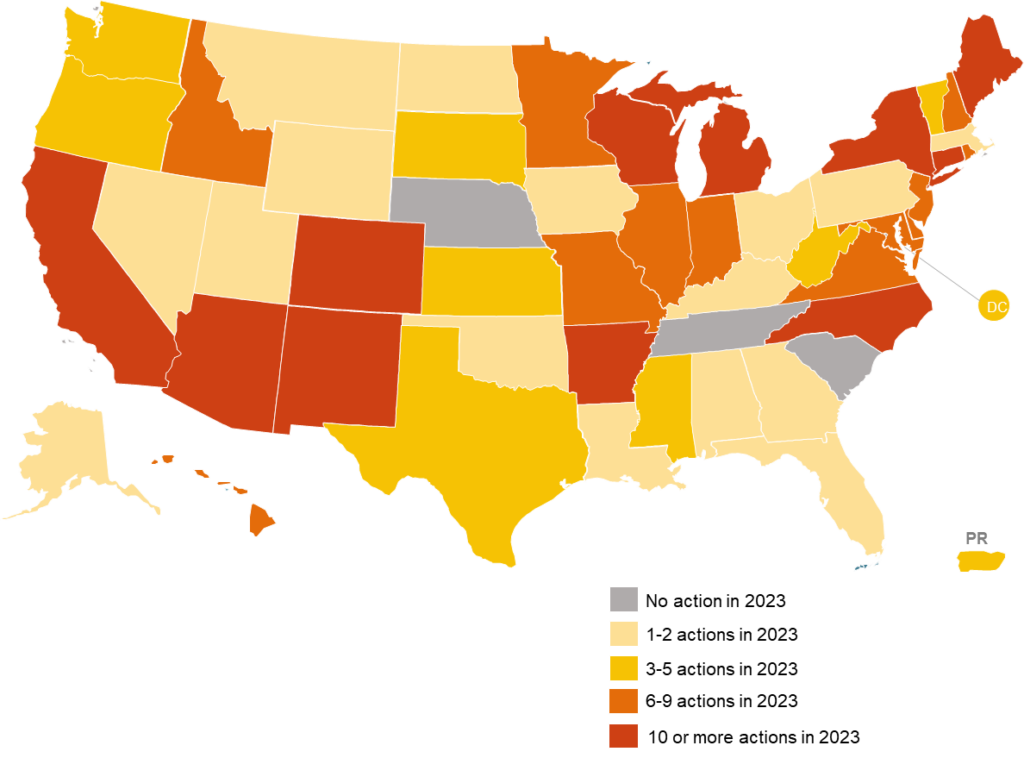The 50 States of Solar: States Expand Community Solar and Move Toward Net Metering Alternatives in 2023
Raleigh, NC – (January 24, 2024) The N.C. Clean Energy Technology Center (NCCETC) released its 2023 annual review and Q4 update edition of The 50 States of Solar. The quarterly series provides insights on state regulatory and legislative discussions and actions on distributed solar policy, with a focus on net metering, distributed solar valuation, community solar, residential fixed charges, residential demand and solar charges, third-party ownership, and utility-led rooftop solar programs.
The report finds that 47 states, plus the District of Columbia and Puerto Rico, took some type of distributed solar policy action during 2023 (see figure below), with the greatest number of actions relating to net metering policies, community solar policies, and residential fixed charge increases. The states taking the greatest number of actions were Maine, California, Colorado, Michigan, North Carolina, Arkansas, and Connecticut.
2023 Policy Action on Net Metering, Rate Design, and Solar Ownership

The report highlights ten of the top distributed solar policy trends of 2023:
- Transitioning to net billing for distributed solar compensation;
- Incentivizing solar for low- to moderate-income customers;
- Utilizing time-varying credit rates for distributed generation;
- Moving away from distributed generation fee proposals;
- Expanding and redesigning state community solar programs;
- Influencing project siting in community solar rules;
- Increasing system size and aggregate capacity limits for distributed generation programs;
- Applying unused net excess generation credits to low-income customers;
- Designing programs for solar paired with energy storage; and
- Utilities initiating net metering successor tariff proposals.
“Many states and utilities are transitioning away from traditional net metering structures and are researching or implementing new rate structures, whether that be net billing, time-of-use based net metering, or something in-between,” observed Rebekah de la Mora, Senior Policy Analyst at NCCETC. “These changes are not just affecting residential customers, but also non-residential customers.”
A total of 273 state and utility level distributed solar policy and rate changes were proposed, pending, or decided in 2023. The report notes that ten of the most active states in 2023 for solar policy developments were:
- Arkansas, where lawmakers passed legislation requiring the transition to a net metering successor tariff and the Public Service Commission approved new tariffs;
- North Carolina, where regulators approved Duke Energy’s residential and non-residential solar choice tariffs, as well as a residential bridge rate;
- Wisconsin, where regulators addressed third-party ownership issues, considered net metering reforms proposed by utilities, and opened a new proceeding to investigate net metering;
- Idaho, where the Public Utilities Commission approved a net metering successor tariff for Idaho Power, and PacifiCorp filed an on-site generation study;
- Michigan, where regulators considered distributed generation program changes proposed by utilities, and state lawmakers increased systems size and aggregate caps for these programs;
- California, where an appeals court upheld the state’s NEM 3.0 rules, while the Public Utilities Commission issued a decision on virtual net metering and considered community solar rules;
- Hawaii, where the Public Utilities Commission approved the designs for HECO’s new smart distributed energy resource tariffs and advanced rates;
- Maryland, where legislators enacted a bill establishing a permanent community solar program for the state to build upon a pilot program;
- Minnesota, where lawmakers enacted legislation creating a successor community solar garden program for new facilities; and
- New Jersey, where regulators issued an order creating a permanent community solar program and legislators enacted a bill establishing a remote net metering program.
“This year has seen actions iterating on community solar programs and encouraging lower income customer inclusion,” noted Vincent Potter, Senior Policy Analyst at NCCETC. “Virginia, New Jersey, and Maryland regulators implemented permanent community solar programs, building on their existing pilots, each of which included provisions to encourage low- and moderate-income customer participation.”
In Q4 2023, 41 states, plus DC and Puerto Rico, took some type of action on distributed solar policy or rate design. A total of 147 actions were tracked in Q4.
View the 50 States of Solar 2023 Annual Review & Q4 Quarterly Report Executive Summary
View and Purchase the 50 States of Solar 2023 Annual Review Q4 Quarterly Report
View other 50 States Reports – Solar, Grid Modernization, Electric Vehicles and Decarbonization
ABOUT THE N.C. CLEAN ENERGY TECHNOLOGY CENTER
The N.C. Clean Energy Technology Center, as part of the College of Engineering at North Carolina State University, advances a sustainable energy economy by educating, demonstrating and providing support for clean energy technologies, practices and policies. It serves as a resource for innovative, sustainable energy technologies through technology demonstration, technical assistance, outreach and training. For more information about the Center, visit: http://www.nccleantech.
Media Contact: Shannon Helm, shannon_helm@ncsu.edu